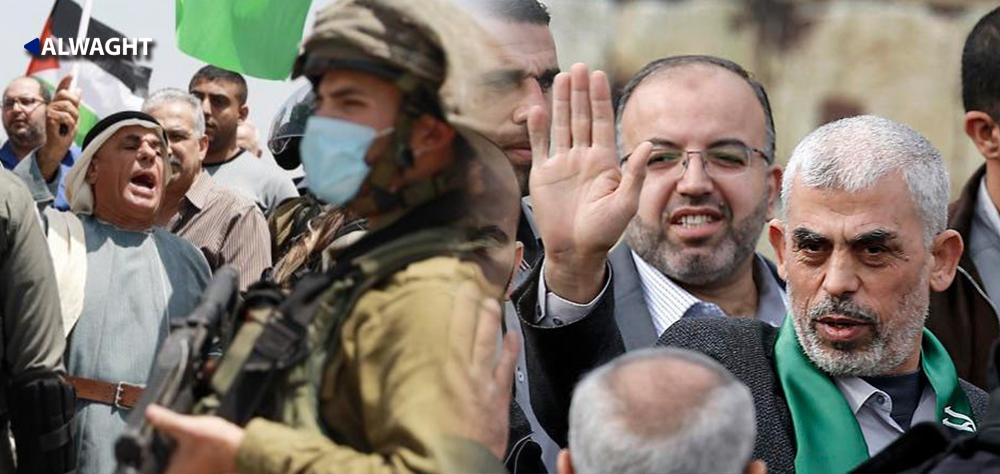Alwaght- About two weeks after the Egyptian-brokered ceasefire agreement in the Gaza Strip, on Friday some West Bank cities, including Nablus and Al-Quds (Jerusalem), became the scene of Palestinian clashes with the Israeli forces. In a new wave of attacks, the Israeli regime has suppressed and detained the Palestinians of 1948. The term 1948 Palestinians refers to those Palestinians who lived in the Occupied Territories beyond the foundation of the Israeli regime in 1948. Tel Aviv calls these Palestinians "Israeli Arabs."
The new clashes took place with the intervention of Israeli police as Palestinians in the south of Nablus, east of Qalqilya and west of Ramallah marched peacefully, demanding the halt of new settlements aimed at changing the demographics of their neighborhoods. Violence erupted, and 293 Palestinians were wounded during clashes with Israeli security forces in the West Bank.
The renewed clashes prompt raises some question: Will Gaza ceasefire collapse and new confrontation begin? What is behind the Israeli new escalation against the Palestinians? Can Tel Aviv manage a new round of confrontation?
Israelis seek to cover up the crisis, avoid accepting the defeat
The first and most important goal of the Israel's in a new round of escalation of violence and attacks on Palestinian citizens can be seen as Tel Aviv's attempt to overcome the crisis and cover up its defeat in the 11-day war on Gaza.
Tel Aviv suffered a severe defeat at the face of Palestinian resistance forces in the recent war, which had a wide range of repercussions both internally and internationally. Therefore, it seems that the Israeli leaders are now seeking to eliminate the marks of this defeat by creating a crisis and diverting the focus from the humiliating defeat. To this end, they have started a new wave of activities in the last two weeks in order to forcefully expel Palestinians from the Silwan neighborhood in the heart of al-Quds, and have even resorted to violence, injuring 23 Palestinians.
In the past few days, the Israelis have flown drones into Gaza airspace, though the Palestinian forces fired at them. The drones, which were predominantly small-sized, flew over Al-Zaytoun, Al-Tufah, Shatee Refugee Camp, Tel Al-Hawa, Al-Rimal, Jabalia Refugee Camp, Beit Lahia, and Al-Karamah neighborhoods. Their number is reported between 20-50, with Palestinian forces managing to shoot down some of them.
Moreover, the Israelis failed to stand on an agreement for prisoner swap with Hamas, mediated by Egypt.
Netanyahu seeks privileges through generating crisis
The recent Israeli escalation has another factor: Netanyahu, the longest-serving Israeli prime minister who is on the brink of collapse after 15 years in power. Reports of an agreement between Neftali Bennet of Yamina party and Yair Lapid of Yash Atid party have shattered Netanyahu's hopes for returning to post. He and his party Likud know that any political stability will play into the hands of the coalition government and, on the contrary, crisis can bring it to failure. Odds are that Likud and Netanyahu are seeking to play their last cards to foil Lapid-Bennett coalition. Some observers even believe that Netanyahu is even planning to start a new round of conflict to stay in power.
Israel incapable of waging new war on Hamas
Despite the fact that Netanyahu and Likud have enough motivations to start a new round of clashes in the Gaza Strip, the evidence on the ground shows that due to the pervasive political, economic, and social crises, the Israeli regime is unable to wage a new war on Gaza. In fact, any new war this time could bring a much bigger defeat for Tel Aviv than the 12-day war. Even worse, it can be suicidal to Tel Aviv, as some analysts warn.
As Yahya Sinwar of Hamas in Gaza made clear, during the 12-day war, "the resistance proved to the Zionist enemy that the holy Al-Aqsa Mosque has its own resolute guards and defense of the holy shrine is a strategic goal. Additionally, the significance of the pressure put on Israel by the West Bank and 1948 Palestinians was higher than the rocket influence. If there would be a new war, the face of the Middle East will change. Israel cannot withstand a real offensive. What happened was just a maneuver assessing our power and potentials. To see a weak face of the Zionists, we do not need war."



























